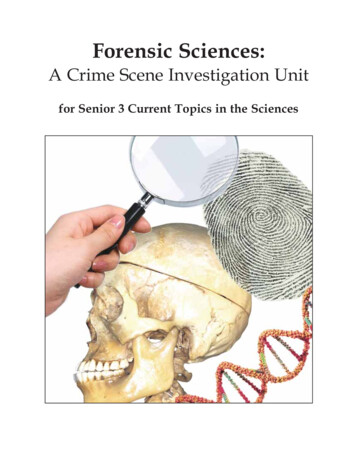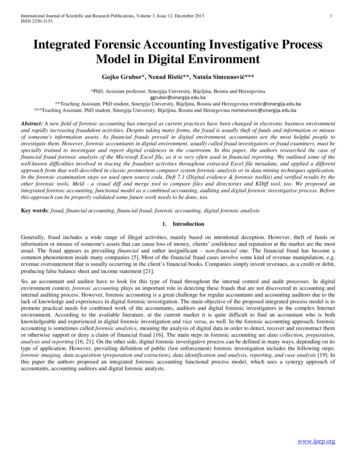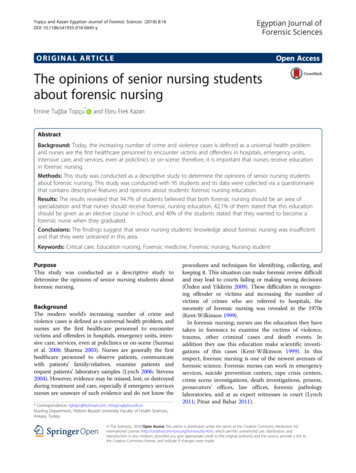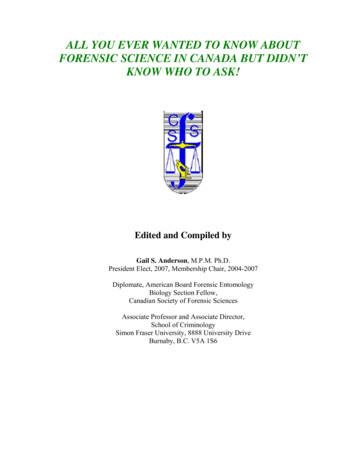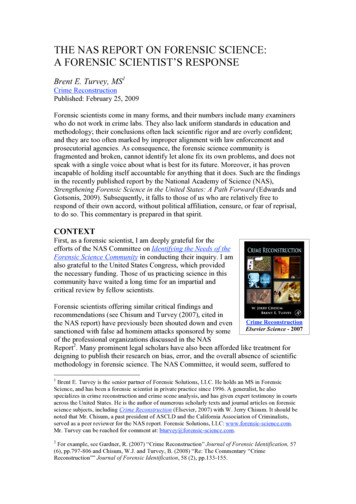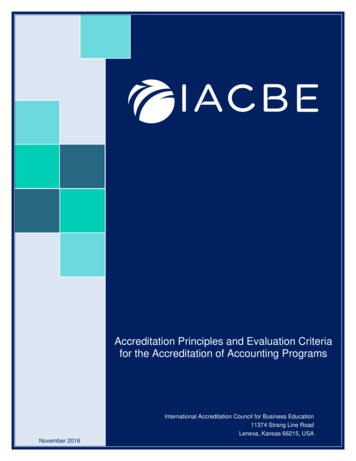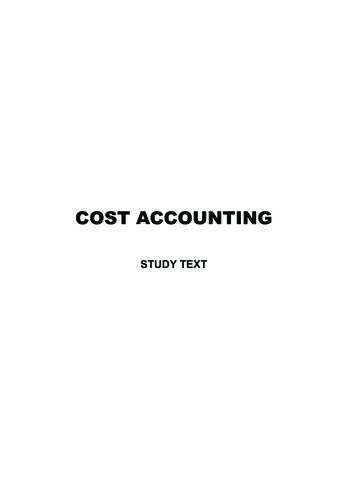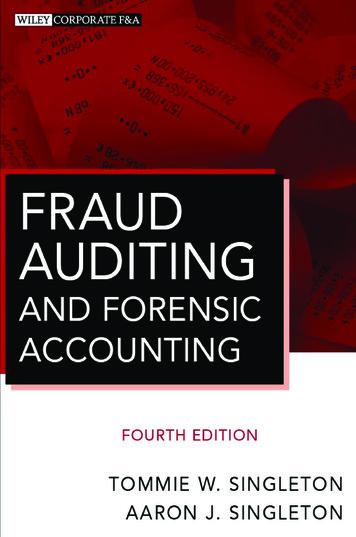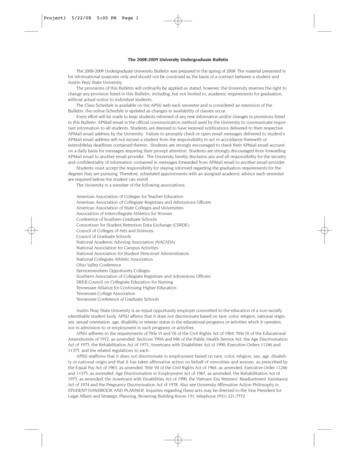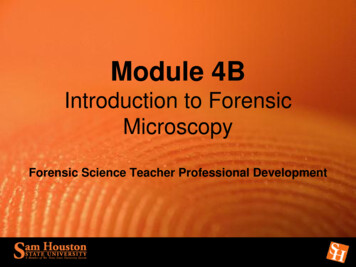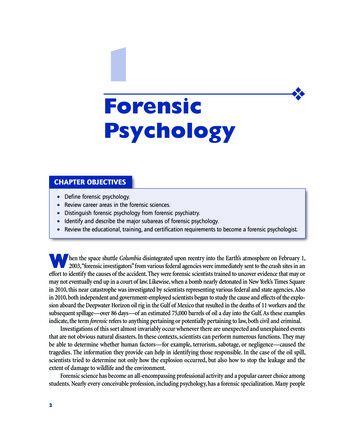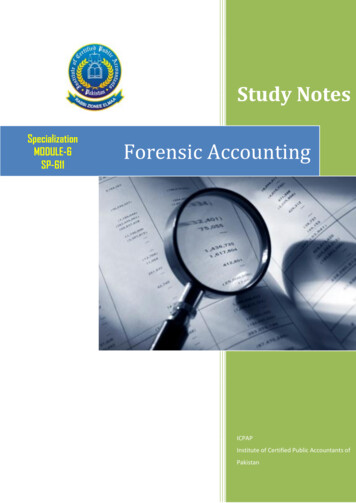
Transcription
Study NotesSpecializationMODULE-6SP-611Forensic AccountingICPAPInstitute of Certified Public Accountants ofPakistan
Forensic AccountingICPAP1. Introduction to Forensic AccountingThe History of Forensic Accounting:Fraud has become an industry, not just for the fraudster. Academics study it, investigatorsinvestigate it, lawyers litigate on it, and conference-goers debate it. But the industry is builton managing the consequences of fraud rather than on preventing fraud. The investigation offraud is only one of the services offered by the professional forensic investigator. Equallyimportant is the creation of a culture and environment which is aimed at the prevention offraud and a response policy which is designed to respond to fraud detection as effectively aspossible. According to a report released by Nedcor, crime cost South Africa R31 billion rendsin 1994/1995. A large part of this amount can be attributed to white-collar crime. Fraud andits roots - greed and arrogance - are human nature. As business people, we must recognizefraud as a permanent risk, a risk we must take action to manage. Fraud is theft. It hits anenterprise in the pocket and has a direct effect on the bottom line. Despite the fact thatstatistics indicate a dramatic escalation in the incidents of fraud over the past decade, certaincompany executives still dismiss the suggestion that they may be victim of, or exposed to therisk of fraud. The extent of fraud and white-collar crime resulted in the formation of variousspecialized units in law-enforcement agencies. It also resulted in a major demand foraccountants in the fields of forensic accounting as such crimes can only be proved withforensic reports and testimony by expertsThe outcome of fraud investigations may be critical to the survival of the business. Even thesmallest engagement ay has serious consequences for individuals, innocent or guilty. It isaccordingly vital that the appropriate experience is brought to bear. A specialist forensicaccountant must always be consulted on potential engagements where fraud is at issue.General type investigation procedures are not adequate to investigate fraud. Differentstandards of evidence and of control and collection of material apply. There are no smallfraud investigation engagements. Seemingly small frauds are frequently the tip of the majoriceberg. All engagements must therefore be carried out to the same high professionalstandards. Fraud investigation work is wide ranging. The same investigation may be covereddetermining whether fraud has occurred and, if so, the nature of the loss and thoseresponsible; tracing of assets lost and legal action against those responsible to obtainrecovery; disciplinary proceedings; civil and criminal litigation. Few clients will haveprevious experience of fraud investigations and investigations will often be undertaken in anatmosphere of serious concern, and perhaps crisis. Effective assistance will be dependent onthe forensic investigator's ability to help the client manage the crisis, shape his expectationsand take action quickly and with discretion. It must be recognized that the outcome ofinvestigations may rest not only on the quality of the investigation but on the decisions madeby the client, and it is therefore vitally important that the client be accurately and correctlyadvised at the outset. It is thus of utmost importance that when fraud of any kind is suspected,Page 1
Forensic AccountingICPAPa experienced forensic team manage and investigate the matter. This can only benefit theclient in the long run.What is Forensic Accounting?Forensic accounting can be defined as assistance in disputes regarding allegations orsuspicion of fraud, which are likely to involve litigation, expert determination, and enquiry byan appropriate authority and investigations of suspected fraud, irregularity or improprietywhich could potentially lead to civil, criminal or disciplinary proceedings. The focus isprimarily on accounting issues, but the role of the forensic accountant may extend to moregeneral investigation which includes evidence gathering. It is because of the fact that bydefinition, forensic assignments are related to judicial or quasi-judicial dispute resolution,that the forensic investigator requires a basic understanding of the applicable statutory andcommon law, the law of evidence and the law of procedure. The most competently conductedinvestigation will be of no value to the client should the evidence gathered be ruled to beinadmissible or the expert accounting witness be found to fall short in respect of therequirements of expertise, credibility, or independence.The Qualities of a Professional Forensic Team:It is essential that a professional forensic team has: Knowledge of the elements of economic crime; The ability to collect evidence and to exercise proper control over large volumes ofdocumentary evidence; The appropriate skills and level of relevant experience; Investigation background; the ability to work in a team with instructing attorneys and police and have the ability to coordinate, manage and administer the litigation support, assemble the documents, and organizemeetings; Knowledge of legal aspects such as the basic rules of evidence relating to admissibility ofevidence and the drawing of inferences; an understanding of what needs to be proved so that evidence documented in his or herreports, letters and affidavits are compiled in a concise, logical and persuasive manner; The ability to testify and stand up to cross-examination in a court of law.Where Forensic Accounting can be applied?Forensic Accounting may be conducted into the following: Fraud and white collar crime investigations;Page 2
Forensic AccountingICPAP Criminal and civil investigations; Preparation of expert reports, reviews and evidence; giving oral evidence in court; insolvency and liquidation support investigation; Fraud prevention and awareness strategies; Fraud and fund tracing; Civil and criminal actions regarding fraud and financial irregularities; Breach of contract; Breach of warranty, particularly on company acquisitions; Insurance claims; Liquidation support; Regulatory enquiries; Special and confidential investigations; Fraud and risk management surveys and reports.A forensic accounting engagement and investigation is typically substantially longer than anyother investigation. Continuity of staff on the part of the client is therefore often difficult tomaintain. This makes it all the more essential that the forensic accountant conducts his workin a manner which is concise, detailed documentedForensic Accounting as PreventionAs regards an appropriate response to fraud which has been detected, every institutionrequires an integrated corporate strategy.An amoral business environment corrupts honest employees.The economy cannot afford business to become a facilitator for crime and dishonesty, merelybecause it has become convenient not to bring culprits to justice.In developing an appropriate fraud response plan, it is essential that an institution considersthe following steps:What are the organization’s major risk areas and what is its policy stance on perpetrators offraud?What is the level of fraud awareness within an organisation?Page 3
Forensic AccountingICPAPAre controls effective?Are customers or trading partners aware of the company's policy on fraud?Do employees understand the company's attitude to fraud and dishonesty?Can employees report fraud confidentially?Are recruitment practices compatible with an honest workforce?Do disciplinary proceedings dispense justice even-handedly and more importantly, are theseen to do so?The Key areas of Forensic Accounting Fraud Investigation Resolving Commercial Disputes Family Law Insurance Claims Valuations Business Intelligence Data Recovery & ConversionThat's a big list of things, so let's give you a brief explanation for each of them:Fraud InvestigationThe bread and butter of Forensic accountants: this is where you become the detective, workout what went wrong, who did it, how they did it and how much money they've stolen.And you're expected to present all your analysis in court or to the police.You can go here for fuller details on forensic accounting and fraud investigation.Commercial DisputesThe list is endless: legal contracts get breached (one party doesn't do what the other party expected) construction workers fall off buildings slanderous comments get made resulting in loss of business employees get sacked unfairlyPage 4
Forensic AccountingICPAP people steal copyrighted work but of course claim otherwiseForensic accountants have to assess the impact of these disputes and in many cases tragedies.As an example, let's say an aircraft maker is expecting a supply of engines from a anothercompany within an agreed timeframe. The engine supplier fails to meet the deadline and hasnow breached the contract.Inevitably a huge fight will break out, the lawyers get called in and not long after so do we.And it could be for either side as they seek to justify their positions.At the end of the day the job is to work out just how much money one party is expected topay the other in compensation.Insurance ClaimsWe're sure everyone can relate to this. You lose something. You claim it on insurance. Nowimagine huge claims on complex transactions. There's work to be done to estimate just howmuch the loss actually is and to then convince the insurance company that it's accurate.Family LawWhen couples break-up the financial side of things usually turns nasty pretty quickly as eachparty lays claim to what is rightfully theirs.The Forensic Accountant has to get in there and assess who has what, checking theassets/liabilities that exist, placing a value on them and then explaining all of that to thelawyers and the couples.And of course, it may all to go court.ValuationsMost people would think of this work arising where business and partnerships need to breakup, like any bad marriage unfortunately.However, but it doesn't necessarily mean a dispute has caused it.For example, a businessman retires and wants to sell his part of the company to a daughter,son or colleague.Key work includes:Valuing a company for a sale (in part or in whole)Company valuations for bank purposes to borrow fundsValuing the shares (or share options) in a company for potential sale or purchasePage 5
Forensic AccountingICPAPThe challenge here is getting the various parties involved agreeing to the valuation. Not easyin the slightest as buyers want it cheap and sellers want it expensive.Business IntelligenceHere's where things turn a bit brighter. Whilst the first five items on our list are mainly aboutthe resolution of problems, Business Intelligence is all about providing - to management insight into how their business is running which will help them to focus on where to deploytheir resources.For example, it will helps management discover where money is being lost so that a decisionto divest (sell) a company can be made.Forensic Accounting and Forensic InvestigationThe concept of Forensic Accounting (never mind a fraud investigation) can be tricky ifyou've never heard of it before.We explained on our "What is Forensic Accounting?" page that there were actually manydifferent "things" that an accountant in the forensic field could actually do.But fraud investigation is the original and best known area.And if you're already working in this field we make no apologies for the level of simplicitywe're using here to explain what it's all about.Most people trying to find out information in this field usually get bamboozled with floweryjargon and big words.Hopefully we're going to avoid that and give you the following:An example of a simple fraudExplain the concepts of Prevent and Detection ControlsWhy Controls FailWhy Big Companies Big FraudsLet's say you run a company. And you put your trust in your employee - Dave - to run thepayroll for you every month.That means he has to pay all your employees their monthly salaries.You put some controls in place to make sure Dave is doing the right thing. That could meanDave supplying you with a sheet of paper showing you which employees are being paid andhow much. You review it and sign at the bottom.Dave then goes off and pays all these employees correctly.Page 6
Forensic AccountingICPAPBut, unknown to you, he adds in an extra employee to be paid that you don't know about.Oh dear.And it turns about to be Dave paying himself extra wages. And he ends up doing this foryears.And then one day Dave doesn't turn up to work and is now living on a beach in SouthAmerica using his "extra" wages. Nice one Dave.Prevention and Detection FraudThere's two ways a company could have stopped this happening.Welcome to the world of Prevention and Detection Controls.And collectively they are sometimes referred to as Internal Controls.Prevention Controls: had the company been smart enough they would have implementedcontrols to stop (i.e. prevent) Dave in the first place. For example, Dave prepares the list ofpeople to be paid but someone else makes the payment. Or two people have to sign thepayroll checks (or authorize on internet banking) before they are released.Detection Controls: these controls come in after the payroll has been paid. For example,someone different from Dave (i.e. you!) gets the bank statements the following day and youcheck that the amount that's left the bank account ties back to the sheet of paper that yousigned the previous day.Hopefully you notice that the two amounts are different and you immediately investigatewhat's happened.That way, you may not have prevented Dave's bad behaviour but you certainly would havedetected it very quickly.Why controls fail?So, if you could have stopped the fraud happening in the first place (or at least limited it) thenwhy do frauds by the truckload continue to happen?You can design as many controls as you feel like, but if you forgot to stick with them thenyou have what are known as "control breakdowns"The main reason is the human factor.Or if we weren't being as nice - people are lazy, forgetful, too busy, didn't understand whatwas needed of them. Whatever the reason - the controls fail.And in the worst case - fraud - someone deliberately ignores the control.Page 7
Forensic AccountingICPAPBig Companies Big FraudsNow, take our simple example and then think about a huge multi-national company withnumerous processes around how their cash is spent and collected - which could be payroll,invoicing clients, stock control and operating expenses.Imagine the sheer number of controls that need to be implemented to make sure that all thecash paid out or received is accurate and properly accounted for.These controls will be a combination of complex computer systems and lots of people. Andthey can breakdown either unintentionally (system bugs, genuine human error).Or a person (or a group of persons) can get together and maliciously set out to commit afraud. That's called collusion.And if they get away with it.then the numbers can be massive.So, what is Forensic Accounting?We're hoping you now have a better understanding of how frauds can be committed in anysize of company and the importance of controls.And we're now also hoping that our definition of Forensic Accounting will make more senseto you.Forensic Accountants are usually called in after a fraud has already been committed.The internal controls have failed. Money has been lost. Particularly in large companies it maynot be clear (or they may not have a clue!) what happened.The company needs to find out.And that's when they call in the accountants, the lawyers, the police and other governmentorganizations if things get really nasty.And the role of the Forensic Accountants is to:Investigate and gather evidence. Interview staffAnalyze that information. Review the controls and how they failed. Query the data systemsWork with the lawyers, police and anyone else who's involved from outside the companyDocument their findings in a clear and concise format which is delivered to the CompanyPrepare further reports/documents that will be used by the Company to launch a legal caseagainst the fraudulent employees.Appear in court to explain the investigation work that they've carried out and the conclusionsthey reached.Page 8
Forensic AccountingICPAPFORENSIC ACCOUNTANT ANDAUDITSIt is important to define the term forensic accountant to ensure readers understand conceptsand narratives throughout the book. One of the key points to understand about forensicaccountants is the difference and roles of financial audits versus fraud audits. This sectionwill discuss some of the issues and differences.Forensic Accounting DefinedIn this book, the term forensic accounting refers to the comprehensive view of fraudinvestigation. It includes preventing frauds and analyzing antifraud controls. Forensicaccounting would include the audit of accounting records in search for evidence of fraud; afraud audit. A fraud investigation to prove or disprove a fraud would be part of forensicaccounting. It also includes the gathering of nonfinancial information, such as interviews ofall related parties to a fraud, when applicable. Forensic accounting includes writing a reportto management or court. Serving as an expert witness and litigation support are part offorensic accounting.Although relatively new to the accounting profession, the role of a forensic expert in otherprofessions has been in place for some time. Webster’s Dictionary defines the word forensicas ‘‘belonging to, used in, or suitable to courts of judicature or to public discussions anddebate.’’ Accordingly, the term forensic in the accounting profession deals with the relationand application of financial facts to legal problems. Forensic accounting evidence, therefore,is oriented to a court of law.Financial Auditors, Fraud Auditors, and Forensic AccountantsIn the lexicon of accounting, terms such as fraud auditing, forensic accounting, fraudexamination, fraud investigation, investigative accounting, litigation support, and valuationanalysis are not clearly defined. Some distinctions apply between fraud auditing and forensicaccounting. Fraud auditing involves a specialized approach and methodology to discernfraud; that is, the auditor is looking for evidence of fraud. The purpose is to prove or disprovea fraud exists. Historically, forensic accountants, however, have been called in after evidenceor suspicion of fraud has surfaced through an allegation, complaint, or discovery.Forensic accountants are experienced, trained, and knowledgeable in all the differentprocesses of fraud investigation including: how to interview people (especially the suspect)effectively, how to write effective reports for clients and courts, how to provide experttestimony in court, and rules of evidence. The ACFE refers to this definition of forensicaccounting as fraud examination. In recent years, the broadest of these terms in the antifraudprofession is forensic accounting, which typically refers to the incorporation of all the termsPage 9
Forensic AccountingICPAPinvolved with investigation, including fraud auditing; that is, fraud auditing is a subset offorensic accounting.Fraud investigation usually encompasses about the same thing as a fraud audit exceptinvestigation typically involves a lot more nonfinancial evidence, such as testimony frominterviews, than a fraud audit. So fraud investigation includes fraud audit but goes beyond itin gathering nonfinancial forensic evidence.Litigation support refers to a forensic accountant assisting attorneys in prosecuting ordefending a case in the legal system. That support can take on a variety of skills butultimately is intended to conclude with the forensic accountant offering an opinion in a courtof law as an expert witness on whether a fraud occurred.Analyst [CVA]) has to establish a value on the loss associated with a fraudulent event,whether it is a spouse trying to hide assets in a divorce case, or a customer claimingexorbitant losses in an insurance claim, or a victim entity suffering from a badmerger/acquisition that ended in a bankruptcy of the subsidiary.Financial auditing is a wholly different term that needs to be distinguished from forensicaccounting and fraud auditing. Financial auditing typically refers to the process of evaluatingcompliance of financial information with regulatory standards, usually for public companies,by an external, independent entity. The well-publicized SOX incorporate concepts andprocedures to deter and to catch fraud in audits of internal controls over financial reporting.However, the focus of financial audits and financial reporting ultimately is concerned withproviding reasonable assurance that a material misstatement to financial statements has notoccurred, regardless of the reason.Financial AuditorsThe term financial auditor broadly applies to any auditor of financial information or thefinancial reporting process. The largest classification of financial auditors is those who workfor public accounting firms and perform audits of financial statements for public companies.This classification is the most commonly used in this book when referring to financialauditors.Financial auditors have expertise in their knowledge of accounting and financial reporting(such as in generally accepted accounting principles [GAAP], PCAOB standards, orInternational Financial Reporting Standards [IFRS]), auditing (generally accepted auditstandards [GAAS]), and how those standards apply to business transactions. As expressed inthe GAAS literature, the most important financial auditing attributes are independence,objectivity, and professional skepticism.Financial auditors traditionally have been seen as, and to an extent have been, numbersoriented, and their processes have been driven by the audit trail. The financial auditprocedures are designed to detect material misstatements, and thus financial auditors focus onPage 10
Forensic AccountingICPAPmisstatements that singularly or in the aggregate are large enough to be material. Fraudauditors and forensic accountants are not constrained by materiality. The discipline offinancial auditing has been thought to be almost a checklist of items to complete.In reality, judgment is crucial in financial auditing and has progressively increased in thedirection of more dependence on auditor judgment. SOX requirements involve auditorjudgment to a large degree; auditors are to understand processes significant to financialreporting and to evaluate management’s controls over those processes. Additionally, auditorsare to consider environmental, including soft, intangible, factors in that evaluation.Fraud AuditorsFraud auditors are generally accountants or auditors, who, by virtue of their attitudes,attribute, skills, knowledge, and experience, are experts at detecting and documenting fraudsin books of records of accounting and financial transactions and events. Their particularattitudes include these beliefs: Fraud is possible even in accounting systems that have tight controls. The visible part of a transaction fraud may involve a small amount of money, but theinvisible portion can be substantial. Red flags of fraud are discernible if one looks long enough and deep enough. Fraud perpetrators can come from any level of management or society.The skills fraud auditors require include all of those that are required of financial auditors,plus the knowledge of how to gather evidence of and document fraud losses for criminal,civil, contractual, and insurance purposes; how to interview third-party witnesses; and how totestify as an expert witness.Fraud auditors must know what a fraud is from a legal and audit perspective, anenvironmental perspective, a perpetrator’s perspective, and a cultural perspective. They alsoneed both general and specific kinds of experience. They should have a fair amount ofexperience in general auditing and fraud auditing, but should have industry-specificexperience as well (e.g., banking; insurance; construction; and manufacturing, distribution,and retailing).Fraud auditing is creating an environment that encourages the detection and prevention offrauds in commercial transactions. In the broadest sense, it is an awareness of manycomponents of fraud, such as the human element, organizational behavior, knowledge offraud, evidence and standards of proof, an awareness of the potentiality for fraud, and anappreciation of the red flags.Some of the functions of a fraud auditor follow.Page 11
Forensic AccountingICPAPIn short, fraud auditing is the process of detecting, preventing, and correcting fraudulentactivities. While completely eliminating fraud is the goal, it is simply not feasible. Theconcept of reasonableness is applicable here, and this concept is often associated with thefraud-related fields of financial accounting and auditing. Fraud auditors should be able tothwart a reasonably preventable fraud.Accounting-type frauds are usually accompanied by the modification, alteration, destruction,or counterfeiting of accounting evidence. But accounting records can be either intentionallyor accidentally modified, altered, or destroyed, by human error or omission. The firstobjective for the fraud auditor, then, is to determine whether a discrepancy in accountingrecords is attributable to human error. If it is, there may be no actual fraud. If the discrepancy(missing records, destroyed records, modified records, counterfeit records, errors, omissions)cannot be attributed to accidental or human error, further investigation should follow at anappropriate level.Forensic AccountantsForensic accountants may appear on the crime scene a little later than fraud auditors, but theirmajor contribution is in translating complex financial transactions and numerical data intoterms that ordinary laypersons can understand. That is necessary because if the fraud comesto trial, the jury will be made up of ordinary laypersons. Areas of expertise of forensicaccountants are not only in accounting and auditing but in criminal investigation,interviewing, report writing, and testifying as expert witnesses. They must be excellentcommunicators and professional in demeanor.The involvement of the forensic accountant is almost always reactive; this distinguishesforensic accountants from fraud auditors, who tend to be actively involved in prevention anddetection in a corporate or regulatory in criminal matters, statements of claim arising in civillitigation, and rumors and inquiries arising in corporate investigations. The investigativefindings of the forensic accountant will impact an individual and/or a company in terms oftheir freedom or a financial award or loss. The ACFE refers to this person as a fraudexaminer.The forensic accountant draws on various resources to obtain relevant financial evidence andto interpret and present this evidence in a manner that will assist both parties. Ideally,forensic accounting should allow two parties to more quickly and efficiently resolve thecomplaint, statement of claim, rumor, or inquiry, or at least reduce the financial element as anarea of ongoing debate. Objectivity and independence of the forensic auditor are paramountfor these purposes.Differences among the ThreeForensic accountants, fraud auditors, and investigative auditors measure financialtransactions in relation to various other authorities, such as the Criminal Code, an insurancecontract, institutional policies, or other guidelines for conduct or reporting. ThePage 12
Forensic AccountingICPAPaccountant/auditor prepares the report rather than the client or subject and does not include anopinion on the findings.In the investigation, one does not reject evidence as being immaterial; indeed, the smallestitem can be the largest clue to the truth.Fraud auditors, forensic accountants, and/or fraud investigators (i.e., all professionalsinvolved with forensic accounting) put things together rather than taking them apart, as is thecase in classic financial auditing or the modern method of systems analysis. The process offorensic accounting is also sometimes more intuitive than deductive, although both intuitionand deduction play important parts. Financial auditing is more procedural in many regardsand is not intended to work as effectively in detecting frauds as the tenets of fraud auditingand forensic accounting.Q1: How would you distinguish forensic accounting, fraud auditing, and investigativeauditing from financial auditing?A. The distinction is related to one’s goals. Financial auditing attempts to enable the auditorto render an opinion as to whether a set of statements upon which the opinion is rendered arealways the representations of management. The auditor is primarily concerned withqualitative values (hence the concept of materiality comes into play) and generally is notconcerned about whether the financial statements communicate the policies, intentions, orgoals of management.B. Forensic accounting is a general term used to describe any financial investigation that canresult in a legal consequence. Fraud auditing is a specialized discipline within forensicaccounting, which investigates a particular criminal activity, namely fraud. Investigativeauditing involves reviewing financial documentation for a specific purpose, which couldrelate to litigation support and insurance claims as well as criminal matters.C. The objective of financial auditing is to provide the auditor with a degree of assurance ingiving an opinion with respect to a company’s financial statements. The materiality level ofan investigative auditing engagement is much lower and more focused than that of the normalfinancial auditing engagement.Q2: How would you define what you do as a forensic accountant?A. I think of myself as one who seeks out the truth.B. I
Forensic Accounting ICPAP Page 1 1. Introduction to Forensic Accounting The History of Forensic Accounting: Fraud has become an industry, not just for the fraudster. Academics study it
